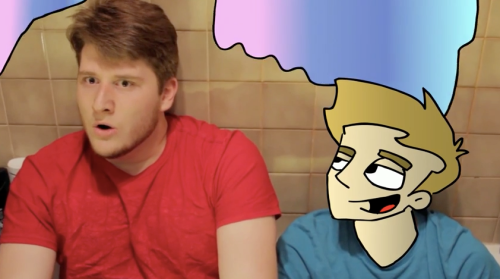
It was love at first camcorder.
During the beginning of his adolescence, Ryan ZumMallen’s parents gave him his first video camera, which he and his friends used to amuse themselves by making videos for fun in middle school. ZumMallen went on to pursue theater in high school, keeping up his knack for the camera and developing a love for adult cartoons, but was puzzled when faced with the decision of a college career. His mom, deeply in support of his dreams, suggested digital cinema studies. ZumMallen, previously unaware that he had that option, did not hesitate.
About 180 miles away, Aaron Margolin’s parents did the same exact thing by giving him a camera to supplement his hobby of making videos, podcasts and radio shows. He stepped up to be the head of his high school’s film club, naturally filling in the role of a leader. Surrounded by his mother’s aptitude for handmade paintings at home, he thrived off creativity and the dedication of pursuing that in college.
Then came the autumn of 2013.
The two college freshmen entered the same room on DePaul’s Loop campus and sat down, next to each other, awaiting their first day of DC110: Foundations of Cinema.
ZumMallen was modest and coy in nature, his blond hair falling down almost all the way to his eyebrows. Margolin, beside him, sat tall, sprightly, with his face framed by thick red hair. Initially, they remained two separate individuals with a mutual imagination and capacity for comedic relief. Months later, their talents fused. Together, ZumMallen, now sporting a classic taper, and Margolin, with his red mane still in check, are the product of a two very difference circumstances, considering ZumMallen came to DePaul from a small town that lingers on the border of Iowa, and Margolin was raised on the bustling Chicago North Shore.
Their first opportunity to work together was on a short film titled “Dear Friend.” ZumMallen was a production assistant, which was the “lowest on the totem pole of that production,” Margolin said.
“And I think about that a lot, because I was a producer, and …” he said, paused and turned to face ZumMallen. “You’re so much more talented than I am, I genuinely think.”
“I was just there to have fun,” ZumMallen said, with a grin and a shrug.
After “Dear Friend,” ZumMallen and Margolin figured out how well they worked together. The next validation came from a peer that approached them, asking for help in making a movie. In a single day, they wrote it. The product was a noir called “Rocco Richards and The Case of The White River,” starring none other than ZumMallen and Margolin themselves.
“We didn’t have much time to cast anyone else,” ZumMallen said.
“But I’m glad it was us,” Margolin said.
They quickly figured out that the chemistry between participants in a production relies on so many things: dedication, appreciation, the skill of being observant and a great sense of humor were all places that the two overlapped. But what made them different is what kept it fresh. So together, they decided to create a musical web series.
Well, it was supposed to be a musical web series.
ZumMallen and Margolin created ARMZ Productions, the host for all of their web-based sketch comedy, short films and a partially animated episode, which both agreed curated the dexterity for their later productions. Chaz Bottoms, a good friend of the two, offered his unique skill to them for their first chance at being animated.
“Anyone who says they don’t want to be a cartoon is a liar,” Margolin said.
But, regardless of the ukulele riffs and original songwriting that their musical would’ve had, their YouTube channel has racked up a loyal audience represented by almost 26,000 views. However, the fans didn’t come immediately. In fact, at first, they didn’t come at all.
ARMZ faced heat just after their first video, “The White Girl Pandemic,” was published. It was a short that used elements of “A Ken Burns PBS documentary,” according to ZumMallen, but it was the content that didn’t land. It was extremely poorly received, as outraged viewers called it misogynistic. ARMZ was off to a rocky start, relying on their next steps to be their comeback.
The videos to follow created much more positive responses. Margolin compared the improved videos, thematically, to “South Park,” because of their alternative approach to content—instead of telling girls how they should or should not act, they make fun of common experiences and perceptions that their audience both recognizes and feels comfortable laughing at with them.
“We lightly poke fun at the culture of things that are ‘normal,’” Margolin said, referring to an ARMZ video called “Fraternities.”
“It’s screaming, loud, classic YouTube comedy,” he said. “It’s also my favorite because Ryan and I are just playing caricatures of ourselves.”
Though ARMZ took nearly a six-month gap from posting to their channel, the duo plans to have an upload within the next two weeks. Right now, their biggest obstacle is time. Always, the biggest concern is that viewers are entertained.
“There was a shift from the beginning, when we thought, ‘People are gonna watch these.’” ZumMallen said. “For an audience, we have our friends, and I’m okay with that.”
“I think for us to be successful, we just have to be making things,” Margolin added. “No one should ever be doing things just to be famous.”

